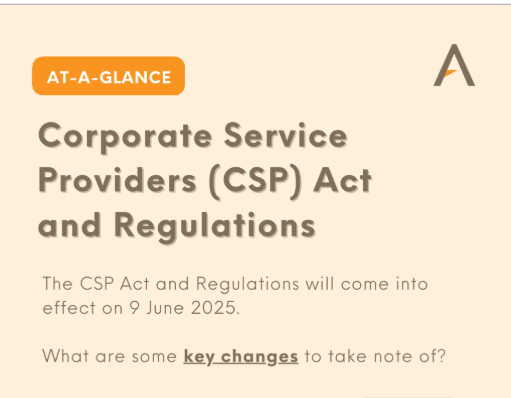Singapore has taken a major step to strengthen its corporate governance landscape with the introduction of the Corporate Service Providers (CSP) Act. Although the Act was passed and commenced on 28 June 2024, full enforcement and compliance will begin on 9 June 2025. This milestone introduces a comprehensive licensing and compliance framework that governs all corporate service providers operating in Singapore.
In this article, we explain the rationale behind the new law, break down its key provisions, and provide a roadmap for service providers and businesses ahead of the 2025 implementation date.
1. Background: Why the CSP Act Was Introduced
Over the years, Singapore has built a global reputation as a well-regulated and transparent business hub. However, due to their proximity to the corporate formation process, corporate service providers (CSPs) can be misused for illicit purposes. These include:
-
Setting up shell companies to obscure beneficial ownership,
-
Facilitating money laundering and terrorism financing,
-
Assisting in the concealment of tax evasion or other financial crimes.
As a result, to address these risks and to align with evolving international standards set by the Financial Action Task Force (FATF), the Singapore government passed the CSP Act. This legislation empowers the Accounting and Corporate Regulatory Authority (ACRA) to oversee and license CSPs, and to enforce compliance with stringent anti-money laundering (AML) and counter-terrorism financing (CFT) obligations.
2. Implementation Timeline: What to Expect and When
Understanding the timeline is critical for proper planning and compliance preparation:
| Event | Date |
|---|---|
| CSP Act commencement | 28 June 2024 |
| Start of transitional period | 28 June 2024 |
| Mandatory compliance and enforcement | 9 June 2025 |
Therefore, all CSPs should use this window to assess readiness, submit licensing applications, and implement the required controls.
3. Who Is Affected by the CSP Act?
The Act applies broadly. Specifically, it covers any business or individual who provides corporate services on a commercial basis. This includes those who:
-
Incorporate business entities on behalf of clients,
-
Provide registered office or nominee director/shareholder services,
-
Act as a company secretary,
-
File statutory documents with ACRA.
Consequently, law firms, accounting practices, and independent corporate secretarial firms all fall under its scope.
4. Licensing Framework: A New Standard for Market Entry
From 9 June 2025 onwards, all CSPs must hold a valid licence issued by ACRA. The framework distinguishes between two classes of licences:
● Class A Licence
This applies to CSPs that are not registered public accountants, such as corporate secretarial and consulting firms.
● Class B Licence
This applies to CSPs that are public accountants or public accounting entities.
Licensing Conditions
To obtain a licence, applicants must meet several conditions:
-
Satisfy “fit and proper” criteria in terms of character, financial standing, and professional integrity,
-
Demonstrate sufficient internal controls and risk mitigation policies,
-
Appoint competent individuals to key positions.
Moreover, ACRA has the authority to reject applications if applicants are unable to show adequate compliance readiness or if there are concerns about their conduct.
5. AML/CFT Requirements: A Risk-Based Compliance Approach
The new regulations impose comprehensive compliance responsibilities on CSPs, aligned with international AML/CFT best practices. Accordingly, CSPs must implement the following safeguards:
a. Customer Due Diligence (CDD)
CSPs must perform CDD before onboarding a client. This involves verifying the identity of the client and its ultimate beneficial owners (UBOs). In addition, the client’s risk profile must be assessed and reviewed periodically.
b. Suspicious Transaction Reporting (STR)
Whenever a CSP suspects that a client or transaction may involve illicit funds, it is required to file a Suspicious Transaction Report (STR) with the Suspicious Transaction Reporting Office (STRO). Timely action is critical in such cases.
c. Record Keeping
CSPs must maintain CDD records and transaction logs for at least five years. Furthermore, these records must be accessible for regulatory review at short notice.
d. Internal Policies and Controls
To ensure ongoing compliance, CSPs must implement internal policies covering:
-
Risk assessment procedures,
-
Staff training programs,
-
Periodic compliance reviews and internal audits.
Larger firms, in particular, are encouraged to appoint a compliance officer to monitor and enforce these controls.
6. ACRA’s Supervisory Powers and Enforcement
Under the CSP Act, ACRA has broad powers to ensure industry compliance. Specifically, it can:
-
Conduct on-site inspections and audits,
-
Request documents and information for investigations,
-
Issue warnings, directives, or remedial action plans,
-
Impose financial penalties for breaches.
In severe cases, ACRA can suspend or revoke a CSP’s licence, or even refer cases for criminal prosecution, particularly when there is evidence of willful misconduct or failure to file STRs.
7. Transitional Arrangements: A One-Year Adjustment Window
To support a smooth transition, existing RFAs are granted interim licensing status from 28 June 2024 to 9 June 2025. During this period, they may continue operating as CSPs without interruption. However, they must apply for a full CSP licence within the transitional window.
Failing to do so will result in their services being legally suspended from 10 June 2025 onwards.
8. Implications for CSPs and Clients
For Corporate Service Providers:
The Act raises the bar significantly. Thus, CSPs must:
-
Re-evaluate their internal policies and systems,
-
Train employees on compliance protocols and red flag indicators,
-
Adopt proper client onboarding and risk classification processes.
Those who fail to act now risk being left behind when the licensing regime takes full effect.
For Clients:
Businesses that rely on CSPs must verify that their service providers are licensed and compliant. Notably, working with unlicensed or non-compliant providers after 9 June 2025 may expose companies to regulatory and reputational risks.
Additionally, clients should expect more rigorous KYC and documentation procedures as CSPs tighten their compliance frameworks.
9. Conclusion: A New Era of Accountability and Professionalism
The CSP Act represents a significant advancement in Singapore’s regulatory architecture. By introducing stricter licensing and compliance obligations, the government is reinforcing its commitment to transparency, integrity, and global standards.
As the 9 June 2025 deadline draws nearer, both CSPs and clients must take proactive steps to meet the requirements. In short, compliance is not just a box to check—it is essential for sustainable business and regulatory trust.
Resources and Next Steps
Contact uSafe Group today as we are fully licensed and compliant ahead of the new regulations taking effect on 9 June 2025—protecting your business from regulatory and reputational risks.
Disclaimer: This article is for informational purposes only and does not constitute any professional advice. Feel free to contact us to consult with our professional advisors team for personalized advice and guidance.






